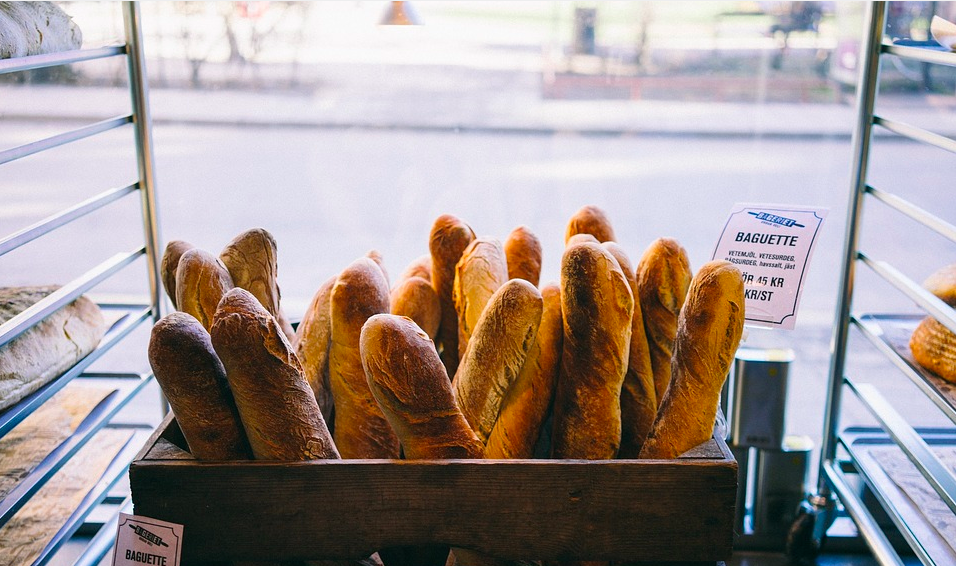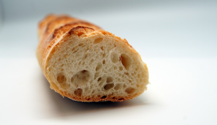Our daily bread — A simple secret

I was in Hobart on holiday from France one summer when I passed a group of backpackers outside a hostel in Liverpool Street. They were all talking French. As I walked by, one of them asked me where they could buy bread. “Well,” I answered, pointing across the road, “there’s Woolworths. And you’ll get fresh bread in any supermarket in Australia,” I explained. A look of dismay crossed his face. Then, rather embarrassed, but very politely, he replied, “Thank you monsieur, we’ve tried their bread. But for French people, it is impossible.”
What he was getting at was that, as far as French people are concerned, the product the Anglo Saxons call bread is hardly edible. Yes, the French certainly take their bread seriously, very seriously.

A good baguette needs to look, feel, smell, taste, and even sound the part.
It should have a soft, somewhat spongy white centre and a thin, crisp, golden-bronze crust that cracks under a little pressure.
When it’s tapped underneath, it should emit a faint hollow sound.
Conversely, they are more than suspicious of the mass-produced version.

The Bread Decree
The 1933 “Bread Decree” was an attempt to combat the rise of what the French see as the invasion of industrial bread. It lays down the law regarding the baking of the baguette de tradition française. And the rules must be respected.
- French bakeries have to make their baguettes on the premises.
- The dough cannot be frozen in any way during the process.
- It may not contain any additives or enhancers that can be used to shorten any of the stages in the cooking process.
- And beware: if the prized word boulangerie doesn’t feature in the name of the bakery, this could mean it’s just another run of the mill dépôt de pain. This means that factory-produced bread could be lurking in amongst the other loaves.
- And, most importantly, a baguette must have just four ingredients: yeast, water, flour, salt. And that’s all. “Oui. C’est tout,” according to Raymond Blanc, the French Anglophile chef and TV presenter who has lived in England since the seventies.
- The only downside is that these rules and regulations, designed to ensure freshness and flavour, means that it goes stale quite quickly.

When Blanc first went across La Manche over fifty years ago, he discovered that good food, even in London, was difficult to find.
But good bread, he says, was impossible to get anywhere.
British taste was conditioned to bleached loaves that were “white, sliced and sold in plastic.”
Brown bread was the same but with added artificial colouring. There was, however a noticeable advantage.
Both were so full of chemicals and preservatives that they kept their ‘freshness’ for ages.
Daily Bread: Understanding cultural differences
These cultural differences caused Raymond Blanc some headaches when he first started a chain of French boulangeries and pâtisseries in Blighty.
- Customers who bought a baguette would return the next day claiming that the bread went stale overnight.
- “Of course,” he’d say. “My bread is not made with flour containing chemicals and preserving agents that keep them eternally soft.”
- “And my croissants may be small, but they taste wonderful.”
- “What would you prefer? A croissant devoid of flavour, made with margarine and lots of yeast to puff them up or a smaller one made with butter and crammed with taste, savour and flavour?”
But it took years for him to get his message across. The French take their baguettes so seriously that there’s a move to have them listed as a ‘Unesco cultural treasure.’
The Confédération Nationale de la boulangerie pâtisserie française has submitted its application to be added to the U.N. rankings of ‘intangible treasures.’
“The baguette is the envy of the whole world,” President Macron said in support of a national bakers’ association application. He believes that the UNESCO listing would protect and shield the baguette from imposters and imitations around the world.
Even those who have never been to France know that there’s something really, really special about the taste of a French baguette straight from the oven.
And, anyone who’s had the experience knows that the best part of buying bread in a village boulangerie is the immediate post-purchase reward. It’s invariably exercised even before leaving the shop. It’s the right to snap off the still warm, crusty tip of the breadstick (le quignon) and pop it into one’s mouth. Everyone does it, from kids to the Curé. It’s hard to explain, but the pleasure one gets is almost sensual. It’s a crunchy taste experience that releases a delicious, fresh, caramelised, floury flavour that lingers long on the palate.
So, back to those French backpackers, I met outside the hostel in Hobart… All they were looking for was a well-made baguette. My guess is that they would have put me forward for a Légion d’honneur if only I’d been able to point them to something that followed these simple rules:
La baguette de tradition française ne peut être fabriquée qu’avec les ingrédients suivants : farine de blé, eau, levure et sel. As Raymond Blanc puts it, “Flour, water, yeast and salt. Et c’est tout.”
How do you know what is artisanal bread and what is industrial bread? Can you tell the difference? Share in the comments below.
Image credits:
1. Baguette Creative Commons
2. Baguette via Wikipedia
3. Baguette Creative Commons
4. Sandwich bread via Wikipedia
3. Unesco heritage Video via France 24
Further reading:
1. French love their bread
2. The breads of France demystified
3. French bread expressions
4. Paris Mosaic: interviews with French business owners: boulangerie fleuristes, patisseries etc







